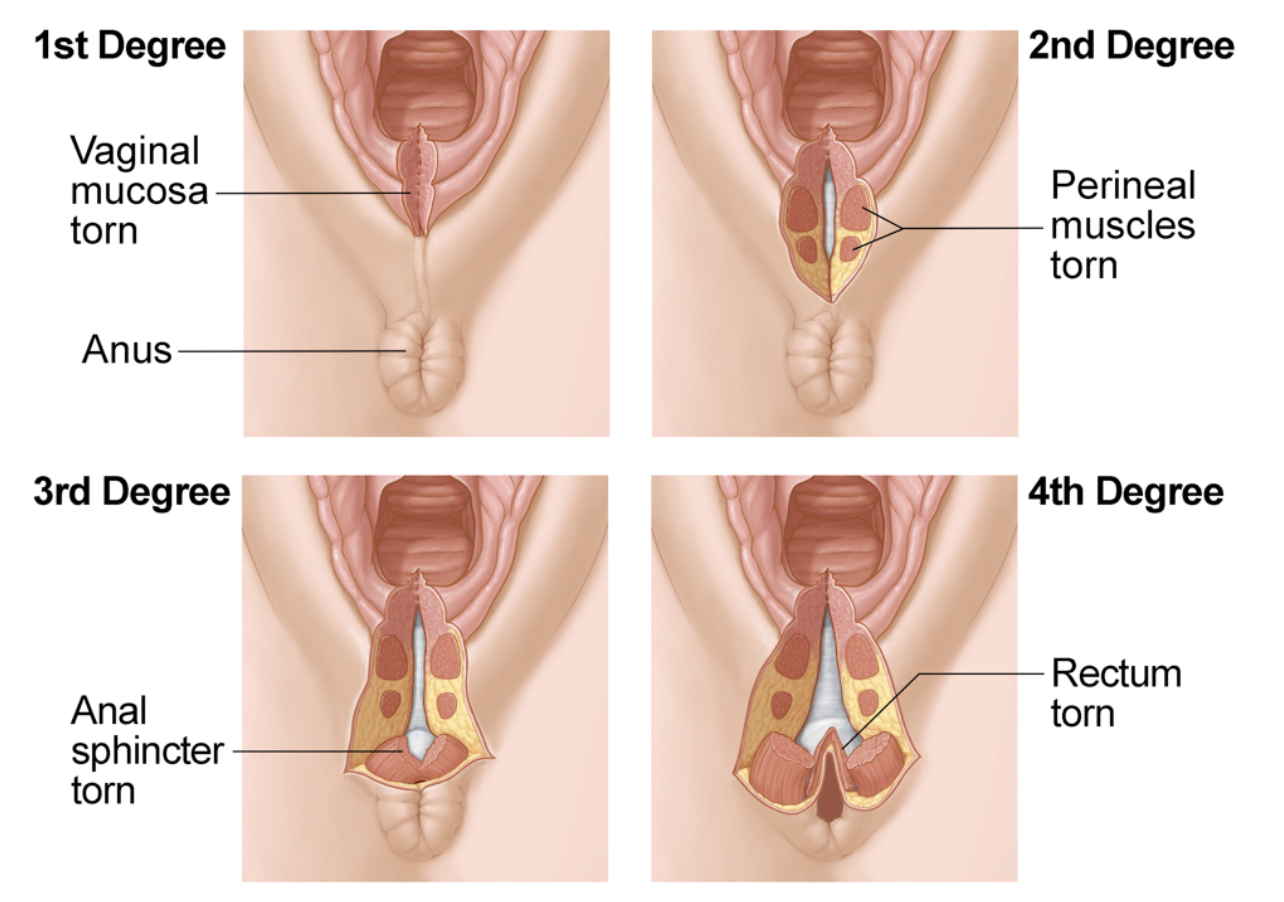Obstetric Lacerations
What are 3rd and 4th degree tears?
During a vaginal birth, there is a possibility of a tear occurring in the region between the vagina and the anus, known as the perineum. This tear can be classified as either a third-degree or fourth-degree tear:
- A third-degree tear refers to a partial tear of the anal sphincter muscles, which are responsible for controlling the opening of the anal canal.
- A fourth-degree tear is more severe and involves damage to both the anal sphincter muscles and the rectum.
 https://www.mangiarellirehabilitation.com/blog/physical-therapy-for-episiotomy-and-perineal-tears
https://www.mangiarellirehabilitation.com/blog/physical-therapy-for-episiotomy-and-perineal-tears
What to Expect Immediately After the Tear
It is expected that you will experience significant soreness and discomfort, which is normal and will gradually diminish over time. After childbirth, you may have a heavier period and occasional cramps, particularly if you are breastfeeding. As the effects of the anesthesia wear off, you might encounter the following sensations, all of which will gradually subside:
- Muscle pain
- Itching or burning sensations around the vaginal and anal areas
- A pulling or tugging feeling where your stitches are located
- General nausea due to administered medications
You may experience discomfort when attempting to sit upright, this is your body signaling that you are putting strain on your stitches. It is advisable to avoid putting weight directly on your stitches by keeping your weight on your sides or lying down. In cases where breastfeeding poses challenges, the support team may recommend sitting upright and assisting you with positioning. It is important to assert that you cannot perform these positions and strive to breastfeed while minimizing pressure on your stitches. Having someone available to assist you as much as possible is recommended. This may involve your partner taking additional time off work or a family member or friend stepping in to provide help. Emphasizing limited movement cannot be stressed enough, as it will yield benefits in the long run. These are some breastfeeding positions you may find more comfortable:
 https://www.mamamend.com/postpartum-health/best-positions-for-breastfeeding-in-challenging-situations
https://www.mamamend.com/postpartum-health/best-positions-for-breastfeeding-in-challenging-situations
What to Watch Out For
- Infection is a possibility, and it is normal to experience vaginal discharge. However, be cautious if the discharge appears discolored and has a foul smell. Infection typically manifests with feelings of illness, a fever, chills, and pain, such as the sensation of fullness experienced during pregnancy. You may also notice redness and warmth in the perineal area. If you have any concerns, it is crucial to reach out to your medical team. Early detection and control of infection are more important than unnecessary trips to the doctor. Trust your body and instincts, and take these symptoms seriously. Do not ignore them, especially when considering the care of your newborn over your own needs.
- Passing flatus (wind) from the vagina or other areas is a common occurrence until the surgical wound fully heals. However, if you notice the passage of wind from somewhere other than your anus, it may indicate that your surgery is not healing properly. It is important to monitor this and consult with your medical team. If you continue to pass wind but not feces from a different location than your anus for an extended period, it may suggest that the surgery has mostly healed, but there are small remaining openings that require attention. Seek guidance from your medical team regarding this matter.
- When it comes to the passage of feces from anywhere other than your anus, it can be challenging to identify the source, especially when you are experiencing postpartum bleeding. Maintaining cleanliness will aid in determining the origin of the feces. If you observe feces coming from anywhere other than your anus, it indicates that the surgery has not been successful, and you should immediately contact your medical team. This is a sign that the surgery has not fully healed. However, don't expect an immediate rush to the hospital. The medical professionals will examine you and provide guidance on the best course of action, which may involve diagnostic tests like scans to assess the extent of healing and medication to facilitate further healing. It is important to note that proper healing can take a considerable amount of time. Passing feces from a location other than your anus can lead to infection, so it must be effectively managed.